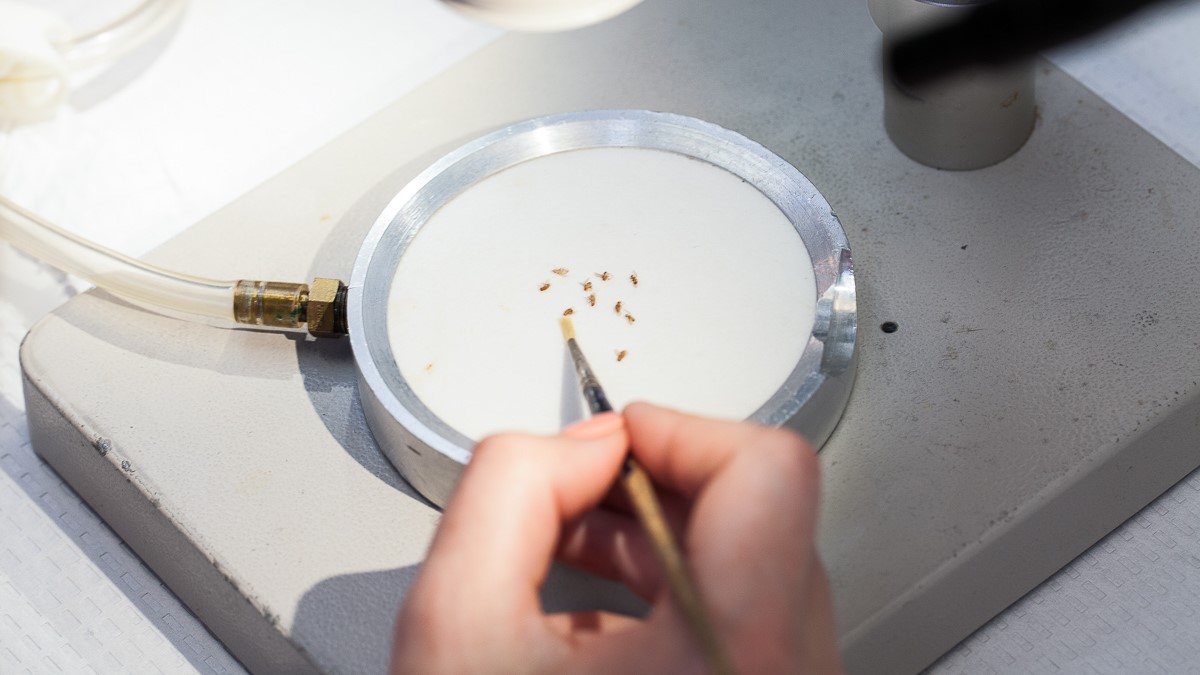 Research using fruit flies is providing insights about the impact sleep has on humans, including the aging process. (Sacramento State/Andrea Price)
Research using fruit flies is providing insights about the impact sleep has on humans, including the aging process. (Sacramento State/Andrea Price)
By Cynthia Hubert
Sleep is one of the keys to mental and physical health, affecting everything from concentration and mood to blood sugar and weight.
Ultimately, sleep quality can help determine how fast we age and how long we live, Sacramento State students recently documented in research published this month in the scientific journal Biology Open.
For their research, undergraduate students led by Assistant Chemistry Professor Johannes Bauer studied the longevity of common fruit flies, whose genetic backgrounds and sleep patterns are remarkably similar to those of humans.
The work confirmed that both sleep and circadian rhythm affect longevity, but perhaps by different mechanisms.
The students found that when they forced flies to live in constant light or constant darkness, disrupting their internal clocks or circadian rhythms, the insects had more health issues and shorter lifespans. But when they looked at flies that were selectively bred for sleep length, they got an unexpected result. Those that had been bred to sleep for dramatically shortened periods of time actually lived longer than flies bred to sleep for longer periods.
Bauer said the findings may have occurred because of metabolic changes that were present in the selectively bred flies. The flies bred to sleep less had lowered levels of energy storage molecules, such as fat and sugar, in their bodies. In other species, lower levels of such molecules are linked to decreased aging.
“Sleep length does in fact regulate longevity, but that process is more complex than we thought,” Bauer said.
The subject warrants further study to gain a better understanding how sleep affects health and aging, he said.
Quality and length of sleep have long been linked to human health effects. Studies have shown that sleep loss can contribute to obesity, diabetes, and heart disease, among other problems.
“I’ve always been interested in bigger, more fundamental problems in science,” said Bauer, who has a long history of research in aging. “Aging is something that is relatable to everyone.”
During the past two decades, scientists have discovered the chemical and biological underpinnings of the aging process. Fruit flies are the perfect subjects for many research projects, because they share “roughly 60% of genes that we find in humans,” Bauer said.
Fruit flies also are economical and take up little space, Bauer noted. “We have 10,000 fruit flies in our lab,” he said. “We can run really robust studies for a cost of next to nothing, and more students are able to participate in research.”
Chemistry students Jacqueline Thompson, Oanh Oanh Su and Nou Yang worked with Bauer on the project.
The researchers hope their work will lead to genetic studies that will further unlock the secrets of the links between sleep and health.
Beyond the results, Bauer said, the study gave undergraduate students crucial experience in the laboratory. Surveys indicate that students who participate in research in college are more likely to pursue careers in the sciences.
Thompson, who graduated in Spring 2020 with a chemistry degree, said conducting research as an undergraduate helped inspire her future goals.
She was a community college transfer student when she started working in Bauer’s lab. “I had never done research before and I wasn’t even positive if I would be accepted into a lab,” Thompson said. When Bauer allowed her to take the lead on the research project, “I was beyond excited,” she said.
Research afforded her new opportunities, including presenting at symposiums, attending conferences and pursuing grants. “All of this would never have happened if I didn’t do research,” she said. “Research opened a door for me that let me explore many different possibilities.”
Thompson is seeking a job in a laboratory and is working on her medical school application.
The sleep and aging study is to be published later this month in the all-access journal Biology Open.
